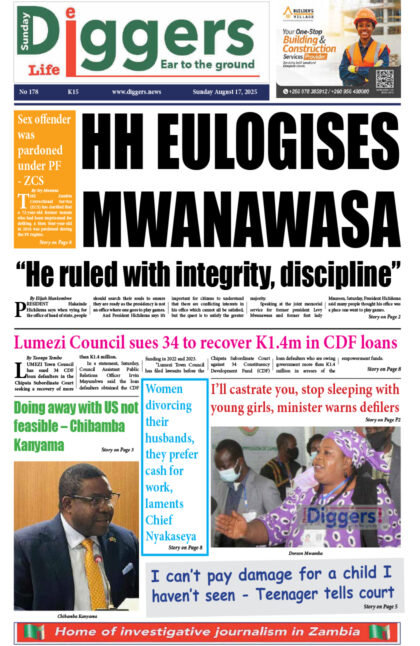ECONOMIST Professor Oliver Saasa has described government’s decision to implement the debt swap as illegal and irresponsible from a government that is stressed with a huge fiscal deficit.
And Prof Saasa says the budget process has become an academic exercise because there is no correlation between what is approved by Parliament and government’s expenditure pattern.
In an interview, Prof Saasa said the debt swap was illegal because it was not appropriated by Parliament.
“Firstly, I do not believe it is legal, that is my very first point. You see, government expenditure is based on what is appropriated by Parliament. It was not there. So where does the money come from? If the money is there, which is surprising, if the money is there, who appropriated when Cabinet is dissolved? The right things must be done. For me, before we even talk about the logic of the debt swap, before you even ask where is the money coming from, it is the issue of process,” Prof Saasa said.
“Under normal circumstances, when Cabinet is dissolved, when Parliament is dissolved, the manner in which financial resources allocations are made, for someone who understands government, it raises a very fundamental issue regarding how can the Presidency and the team of Permanent Secretaries reach a decision like this on their own. Secondly, it is not equitable, meaning that it only attaches those that had access to loans. Not all civil servants had access to loans. It is not because it is bad targeting, it only favours those [who have borrowed], how about those that have not borrowed? How about those that have borrowed from individuals? They are many, how much relief are you going to give them?”
Prof Saasa said if government really cared about the workers, it would instead clear all the debt owed to them.
“To get a loan and you go to a micro financial institution, you sign a contract, which is legally binding by the way, regarding the interests you pay. Government was not part to that, how can you use taxpayers’ money, especially in a stressed economy, to get that money where firstly, you are not paying retirees their benefits? You know that many of the workers in local government institutions like councils have not been paid salaries so if you really care for these civil servants, for these workers, why don’t you pay what is due to them? Rather than getting into the private sector, private individuals, use the same government money which is taxpayers money to sound like you are a good guy when in fact you owe money. Right now, government owes close to $7 billion equivalent to salaries,” he said.
“That is the legal obligation, why are you not paying them? Because they are Zambians too. These microfinance institutions, some of them 80 per cent of their loan hook are civil servants. So, if you suspend for three months, you are closing them down. When you close them down, it means they will be owing as well. These guys are going to close down, where are they going to get the salaries for their workers? Where are they going to get the money to service their debt because they also have debt?”
Prof Saasa said government’s decision to implement the debt swap was a “clumsy” decision from a country which was financially stressed.
“So, it is extremely irresponsible if you ask me. For me, when you look at all that and then the issue of where is the money going to come from, are we printing money? I am not saying they are printing money, but it raises a lot of questions regarding where suddenly has the money come from? There are still many questions, what happens when someone resigns after a month or two from civil service? How are you going to manage that?” Prof Saasa wondered.
“There are so many unanswered questions. For me, this was a knee jerk, political thing that is meant perhaps to woo votes, but which has been done in a very clumsy manner and has no equality in terms of targeting. Probably they look at them as voters, it is not strange that it is three months and the middle of those three months is election. It is just so many unanswered questions. This is something that will raise and has raised eyebrows of the likes of the IMF because in a country that is stressed, especially with the huge fiscal deficit, you cannot expect government to be extravagant.”
And Prof Saasa said the budgeting process had become an academic exercise.
“We have a problem at that level with the current government, where there is no correlation between what is approved and appropriated by Parliament and the expenditure pattern, how much they are spending? So, in other words, budgeting has become an academic exercise. There is no relationship, there is very little correlation between what we set ourselves to realise using the Zambians laws, budgeting and programming, approval by Parliament and the actual expenditure. So as a result, we have suffered a very serious fiscal deficit on current accounts. We have allocated resources away from what we appropriated,” said Prof Saasa.
























